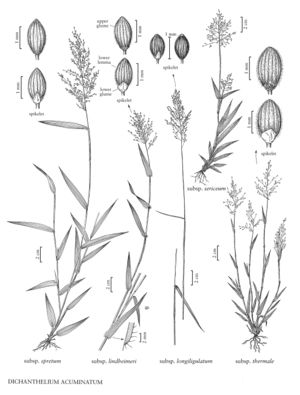Difference between revisions of "Dichanthelium acuminatum subsp. lindheimeri"
FNA>Volume Importer |
FNA>Volume Importer |
||
| Line 7: | Line 7: | ||
|name=Panicum lindheimeri | |name=Panicum lindheimeri | ||
|authority=unknown | |authority=unknown | ||
| − | }}{{Treatment/ID/Synonym | + | }} {{Treatment/ID/Synonym |
|name=Panicum lanuginosum var. lindheimeri | |name=Panicum lanuginosum var. lindheimeri | ||
|authority=unknown | |authority=unknown | ||
| − | }}{{Treatment/ID/Synonym | + | }} {{Treatment/ID/Synonym |
|name=Panicum acuminatum var. lindeheimeri | |name=Panicum acuminatum var. lindeheimeri | ||
|authority=unknown | |authority=unknown | ||
| Line 24: | Line 24: | ||
-->{{Treatment/Body | -->{{Treatment/Body | ||
| − | |discussion=<p>Dichanthelium acuminatum subsp. lindheimeri grows in dry or moist, sandy or clayey, open, often disturbed areas, open woodlands, limestone glades, and roadsides, primarily in the eastern portion of the species range. It intergrades occasionally with the pubescent subsp. fasciculatum and subsp. implicatum.</p> | + | |discussion=<p><i>Dichanthelium acuminatum </i>subsp.<i> lindheimeri</i> grows in dry or moist, sandy or clayey, open, often disturbed areas, open woodlands, limestone glades, and roadsides, primarily in the eastern portion of the species range. It intergrades occasionally with the pubescent <i></i>subsp.<i> fasciculatum</i> and <i></i>subsp.<i> implicatum</i>.</p> |
|tables= | |tables= | ||
|references= | |references= | ||
| Line 44: | Line 44: | ||
|publication year= | |publication year= | ||
|special status= | |special status= | ||
| − | |source xml=https://jpend@bitbucket.org/aafc-mbb/fna-data-curation.git/src/ | + | |source xml=https://jpend@bitbucket.org/aafc-mbb/fna-data-curation.git/src/8f726806613d60c220dc4493de13607dd3150896/coarse_grained_fna_xml/V25/V25_1163.xml |
|subfamily=Poaceae subfam. Panicoideae | |subfamily=Poaceae subfam. Panicoideae | ||
|tribe=Poaceae tribe Paniceae | |tribe=Poaceae tribe Paniceae | ||
Revision as of 17:28, 18 September 2019
Culms often yellowish-green, usually glabrous; nodes glabrous; fall phase usually with stiffly spreading culms with dense fascicles of branches with reduced, often involute blades. Cauline sheaths often yellowish-green, usually glabrous or the lowest sheaths sparsely ascending-pubescent; blades 4-9 cm long, 4-8 mm wide, stiffly ascending or spreading, often yellowish-green, glabrous on both surfaces or puberulent abaxially, bases rounded, margins faintly whitish-scabridulous, with conspicuous, long, papillose-based cilia at the base. Primary panicles 3.5-7 cm, open, less than twice as long as wide. Spikelets 1.3-1.6 mm, diverging to ascending, usually obovoid, obtuse.
Discussion
Dichanthelium acuminatum subsp. lindheimeri grows in dry or moist, sandy or clayey, open, often disturbed areas, open woodlands, limestone glades, and roadsides, primarily in the eastern portion of the species range. It intergrades occasionally with the pubescent subsp. fasciculatum and subsp. implicatum.
Selected References
None.
